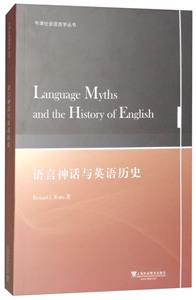-
>
考研英语背单词20个词根词缀
-
>
西班牙语词根宝典
-
>
美国K-12原版语文课本--初中·下(全12册)
-
>
流浪地球刘慈欣
-
>
西南联大英文课 轻读礼盒版
-
>
英语大书虫世界经典名译典藏书系:中国人的精神 (英汉对照)(精选权威版本)
-
>
许渊冲译唐诗三百首:汉文·英语
语言神话与英语历史 版权信息
- ISBN:9787544650144
- 条形码:9787544650144 ; 978-7-5446-5014-4
- 装帧:一般胶版纸
- 册数:暂无
- 重量:暂无
- 所属分类:>
语言神话与英语历史 内容简介
《牛津社会语言学丛书》所选的这些专著内容广泛,又较贴近我国学者研究的需求,涵盖了当今社会语言学的许多重要课题,如语言变体与语言变化、语言权力与文化认同、语言多元化与语言边缘化、语言与族裔、语言与立场(界位)、语言与新媒体、语用学与礼貌、语言与法律以及社会语言学视角下的话语研究等等。其中既有理论研究,又有方法创新;既有框架分析建构,又有实地考察报告;既体现本学科的前沿和纵深,又展现跨学科的交叉和互补。 理查德·J·沃茨著的《语言神话与英语历史(英文版)/牛津社会语言学丛书》为丛书之一,作者从后现代思想出发,以解构主义手法,批判了传统英语史,指出英语整个历史的构建是语言神话的构建。本书供语言学研究生、相关研究人员参考。
语言神话与英语历史 目录
- >
烟与镜
烟与镜
¥18.3¥48.0 - >
罗庸西南联大授课录
罗庸西南联大授课录
¥14.1¥32.0 - >
唐代进士录
唐代进士录
¥16.1¥39.8 - >
经典常谈
经典常谈
¥16.7¥39.8 - >
【精装绘本】画给孩子的中国神话
【精装绘本】画给孩子的中国神话
¥18.6¥55.0 - >
中国人在乌苏里边疆区:历史与人类学概述
中国人在乌苏里边疆区:历史与人类学概述
¥21.6¥48.0 - >
巴金-再思录
巴金-再思录
¥15.7¥46.0 - >
中国历史的瞬间
中国历史的瞬间
¥16.7¥38.0
-
哈萨克斯坦文化教育研究
¥118.4¥188 -
英语与中国
¥25.5¥52 -
英语测试
¥8¥19.9 -
不良情绪应急处理包--孤独感
¥12.9¥30 -
不良情绪应急处理包--精神内耗
¥12.9¥30 -
孩子、家庭和外部世界
¥17.8¥56
物流系统工程――理论、方法与案例分析(第3版)
¥29.9¥49.0

















